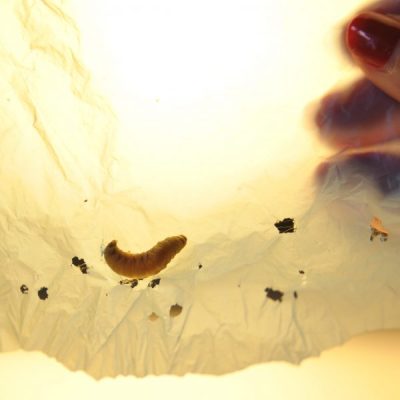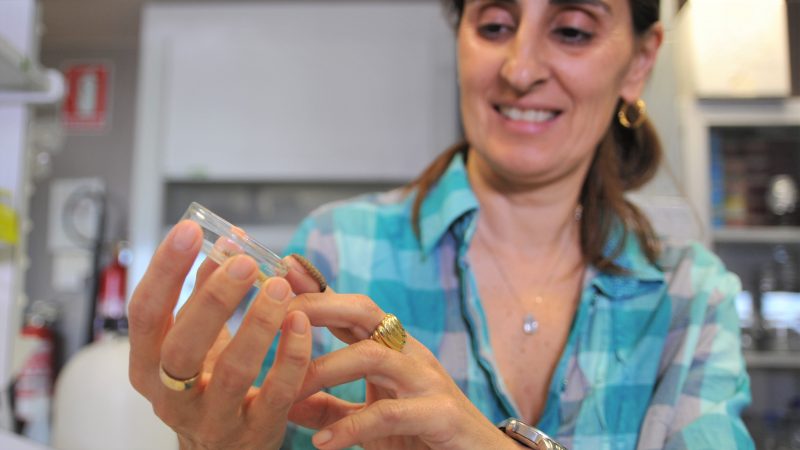Outlawed now in some places, or only available to tote your purchases at a ridiculous premium, the billions of “T-shirt” bags used every year present a serious waste management problem. Whether blowing across the landscape like synthetic tumbleweeds, floating in the ocean as ersatz jellyfish, or clogging up municipal waste streams, finding a way to deal with them could really make a difference. And finding a bug that eats polyethylene and poops antifreeze might be a great first step in bioremediating the mess.
 As with many scientific discoveries, learning about the useful and unexpected eating habits of the larval stage of the Greater Wax Moth Galleria mellonella can be chalked up to serendipity. It began when biochemist [Federica Bertocchini] cleaned a wax moth infestation from her beehive. She put the beeswax-loving pests in a plastic bag, later finding they had chewed their way out. Intrigued, she and [Paolo Bombelli] ran some experiments using the bugs. They showed the mechanism wasn’t just mechanical and that the worms were digesting the polyethylene, to the tune of 92 mg consumed for 100 worms in 12 hours. That’s about 1,000 times faster than bioremediation with bacteria.
As with many scientific discoveries, learning about the useful and unexpected eating habits of the larval stage of the Greater Wax Moth Galleria mellonella can be chalked up to serendipity. It began when biochemist [Federica Bertocchini] cleaned a wax moth infestation from her beehive. She put the beeswax-loving pests in a plastic bag, later finding they had chewed their way out. Intrigued, she and [Paolo Bombelli] ran some experiments using the bugs. They showed the mechanism wasn’t just mechanical and that the worms were digesting the polyethylene, to the tune of 92 mg consumed for 100 worms in 12 hours. That’s about 1,000 times faster than bioremediation with bacteria.
Furthermore, the bugs excrete ethylene glycol, a useful industrial chemical, in the process. Finally, to see if the process can scale, the researchers showed that a homogenate of wax moth larvae could digest PE sheets. This could lead to an industrial process if the enzymes involved can be isolated and engineered. The letter describing the process is a fascinating read.
While this one may not a classically hackish way to deal with plastic recycling, the potential for this method is huge. We look forward to seeing where this goes.
[Images: César Hernández/CSIC]
















This is certainly a stepping stone but not entirely helpful in it’s current state.
If we have the ability and will to collect every stray bag to feed to caterpillars it makes more sense to blend them with virgin resin to make new products. We spend tons of energy to crack petroleum into PE feedstock but then use caterpillars to break it down into degradable compounds? Might as well throw it in an incinerator and harvest the energy for steam generation to run turbines.
Right, the problem is them not being collected up, and straying into environment.
Which is another problem. Or two. So do you breed and release a bunch of caterpillars to eat any polyethylene they happen across, not really knowing what other ways they will fit into the ecosystem? And where they are successful, do they leave little pools of ethylene glycol, which is both tasty and toxic to some animals?
These worms are already wild creatures that live in the environment… If you bred up a bunch and released them, the local birds/lizards/mammals would thank you for the buffet.
The local birds/lizards/mammals would thank you for the buffet.
The local bees might not feel the same though, and the bees are already over exploited to the point of well established colonies collapsing.
https://m.youtube.com/watch?v=TS9PWzkUG2s maybe you wil find it interesting
Nice link – but you should have said what it was about (so interested people might read it).
To fill in the blank, it is about worms that eat Styrofoam.
Unless there is a cost to the consumer for not handling the shopping bags in an overall environmentally “green” matter, the consumer has no incentive to do so. Until that is resolved; recycling or alternate disposal methods a moot
Which is why, here in the UK, plastic bags are charged for in stores. If you have to pay for them, you’ll re-use them to avoid buying more.
Exactly.
“To Deal with Plastic Trash, All You Need is Bugs” would rather be “To Deal with Plastic Trash, All You Need is Common Sense”.
Not that this approach to biodegrade plastics ain’t cool or useful: there will always be an “irreducible rest” at the end. But if we don’t cope with the problem at the “ingress” I fear we won’t make it.
If your boat is filling up, you’re going to bail, but at the same time, if ever possible, you’re going to find out where the water is coming in in the first place, I’d hope.
Charging a small price on those bags which will cover (at least) the research & development on how to cope with the aftermath seems reasonable to me.
The plastic bag dilemmma crawls on…yet almost everything one purchases in a supermarket has a plastic wrapping somewhere. A joint of meat, bacon, milk, cheese, snacks, etc now come in pre-packed portions. I do miss the days when one would go to the store and ask for 1/2lb butter which the proprietor would portion out and ‘pat’ it into a regular shape then wrap it in paper. Or cut the cheese (no puns) using a block and a wire cheese-cutter …then wrap it in paper. Milk would come in EASILY recycleable containers (bottles). A joint of beef would be cut, rolled, tied and then…wrapped in paper.
At least one can say that fish & chips still comes wrapped in paper.
> At least one can say that fish & chips still comes wrapped in paper.
True. But both contain enough plastic already so that you could just wrap them up within themselves. Iterative packaging.
I kept staring at that image, waiting to see the thing eat…
[notsureifgif.gif]
I try to recycle what I can…
First, lets all agree to stop using PVC for packaging; terrible stuff environment-wise.
Secondly, for the PE, could we somehow inject some bug genes into clams and attack that giant whirlpool of trash in the ocean please?
I despise landfills. They are simply government-approved littering sites. ‘Throw your empty bottles, broken electronics, and uneaten food here because recycling and composting is too hard.’ :/
I can see it now:
Project manager “well, how are the bioremediation clams doing?”
Researcher “uh, well the plastic has been digested… but now we have several million tons of ethylene glycol in the open water. We’re looking at the extinction of several ocean dwelling species.”
Project manager “… but the plastic is gone, right? Good work everyone!”
That giant whirlpool of trash in the ocean is being digested away quite handily by microbial action already. We keep dumping more into the ocean, so there is a steady-state level observed. It is a multi-year process, but if we stopped dumping, the trash would vanish surprisingly quick.
Totally agreed on landfills. Fortunately, some countries/areas are starting to use their landfill as a fuel source enough that they’re running out of trash.
Well that makes me feel better. :)
Do you have any references to share?
Please NOOOOO!!!! I’m beekeeper!!! This butterfly is a damn #@!##: …If you want, play reproduce the enzyme yes, but please do not propagate this animal in the environment !Without bees forget about ¾ of your food! All honey you’ll find will be in super-mega stores like it’s now there: syrup of sugar with teast of honey !
A possible preventive measure against spreading might be to try and selectively breed the moths to be flightless and remove some of the traits that allow them to sneak into bee hives without being attacked.
Very interesting. Those puppies should be brought in to existing landfills.
“The planet will be here for a long, long, long time after we’re gone and it will heal itself, it will cleanse itself ’cuz that’s what it does. It’s a self-correcting system. The air and the water will recover, the earth will be renewed, and if it’s true that plastic is not degradable well, the planet will simply incorporate plastic into a new paradigm: the earth plus plastic. The earth doesn’t share our prejudice towards plastic. Plastic came out of the earth. The earth probably sees plastic as just another one of its children. Could be the only reason the earth allows us to be spawned from it in the first place: it wanted plastic for itself. Didn’t know how to make it, needed us. Could be the answer to our age-old philosophical question, “Why are we here?” “Plastic, a******s!” – George Carlin on “Saving the Planet”
Can we re-engineer these caterpillars to poop filament?
Perhaps the silk worms could donate some genes. However, the prospect of mounting a living wax worm on a printer is a bit daunting.
This could be a huge game changers for the disposal of plastic bags.
The worms could be used as high quality chicken or fish feed.